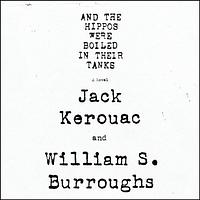Take a photo of a barcode or cover
challenging
funny
medium-paced
challenging
dark
emotional
funny
mysterious
reflective
sad
tense
medium-paced
Plot or Character Driven:
A mix
Strong character development:
Complicated
Loveable characters:
Complicated
Diverse cast of characters:
No
Flaws of characters a main focus:
Yes
This is a book you read more because you're an obsessed fan than because it's a work of art. As an obsessed fan, I enjoyed its expected lunacy and the glimpse into a generation that never ceases to fascinate me. You don't read it for the plot or the characters or the story. You read it because you love this kind of s#$! - the unpublished, the collaborative, the defining and representative. Not quite On The Road, but still worth the couple hours it offered.
– Agnes nie chce iść z nami na kolację, bo nie ma forsy. Niektórym zostało jeszcze trochę godności.
– Ludzie mają różne dziwne pomysły – stwierdził Phillip.
– Owszem – potwierdziłem. – Ale ty jesteś artystą. Nie uznajesz przyzwoitości, uczciwości i wdzięczności.
Jedzenie szkła, chodzenie po mieszkaniach przyjaciół szukając tych, którzy akurat mają pieniądze, plany ucieczki do Paryża i kłótnie na dachach — ta książka w skrócie.
Styl prosty, ale bardzo obrazowy, nadający klimat Nowego Jorku lat 40. Sporo unhinged one-liners. Najciekawszy jednak był dla mnie kontekst powstania i wydania tej książki (który już znałem) oraz posłowie.
– Ludzie mają różne dziwne pomysły – stwierdził Phillip.
– Owszem – potwierdziłem. – Ale ty jesteś artystą. Nie uznajesz przyzwoitości, uczciwości i wdzięczności.
Jedzenie szkła, chodzenie po mieszkaniach przyjaciół szukając tych, którzy akurat mają pieniądze, plany ucieczki do Paryża i kłótnie na dachach — ta książka w skrócie.
Styl prosty, ale bardzo obrazowy, nadający klimat Nowego Jorku lat 40. Sporo unhinged one-liners. Najciekawszy jednak był dla mnie kontekst powstania i wydania tej książki (który już znałem) oraz posłowie.
Nice quick read. Captivated my attention the whole way. I like this Burroughs more than naked lunch Burroughs
The story behind And the Hippos Were Boiled in Their Tanks is reason enough to read this book. It was inspired by the Columbia University murder of David Kammerer by his friend Lucien Carr, a talented and enigmatic writer who happened to be close friends with William S. Burroughs, Jack Kerouac, and Allen Ginsberg. This murder case became an essential foundation of the Beat Generation as it inspired two unknowns at the time (Kerouac & Burroughs) to collaborate on a tale of crime, bohemia, drugs, and art in which they play the main characters. What I find even more interesting is that the manuscript was not published until 2008, more than 60 years after it was written, long after Kerouac, Burroughs, and Lucien Carr had been dead. This was due to a promise that was made to Lucien Carr: the book would be forgotten until after he passed away. To me, And the Hippos Were Boiled in Their Tanks is a chunk of history that delves into the minds of Kerouac and Burroughs, exposing the raw history of their pasts and the inspiration behind their writing careers.
challenging
dark
tense
fast-paced
Plot or Character Driven:
Plot
Strong character development:
No
Loveable characters:
No
Diverse cast of characters:
Complicated
Flaws of characters a main focus:
No
Interesting to read this as one of their first books. I can see how the writing style later evolved to their more popular books. I liked getting a feel for the more outsider-type lifestyle of the 1940s. It was interesting to see how they viewed and treated queer people and women. The characters were a bit annoying and there was a lot of rambling without much plot. A lot of repetitive things happened so it got a bit redundant and boring. The murder kind of came out of no where and then the book ended. I'm doing 3 stars mostly because I like seeing this in its historical context and that it's a fictionalize account of this real-life murder experience, but the plot itself wasn't great and the writing could improve.
Graphic: Alcoholism, Cursing, Death, Drug use, Hate crime, Homophobia, Toxic relationship, Stalking, Murder, Toxic friendship, Alcohol
Moderate: Domestic abuse
Minor: Misogyny, Physical abuse, Racial slurs, Racism, Suicidal thoughts, Blood, Sexual harassment, War
Probably not the best beatnik prose ever written, but it is always fun to see two authors cooperate (and in this one two good authors, but before they actually published anything - so you could say tht this was their beginning). It also reminded me how much fun it is to work on such cooperations and hopefully I will now get back to working on my cooperations - was a bit low on time in the meanwhile, but hopefully it will turn for the better now...
The characters in these Beat novels are all such criminals, it's so funny! The dialogue of Kerouac and Burroughs is entirely believable and I enjoyed the similarities and contrasts of today with 1940's New York. Kerouac does outwrite Burroughs, he has a bit more depth and Burroughs comes across a little stilted. The Afterword, where the work is put in its factual context, is probably the most interesting part though.
fast-paced
Plot or Character Driven:
A mix
Strong character development:
No
Loveable characters:
No
Reading the beats at this time in life and history serves as a bit of a Time Machine. This novel is set within my own father’s life span and yet, so much has changed with culture, it’s nearly unrecognizable to me, certainly to my teenage sons. The old movies normalize it a bit more, but it is becoming increasingly foreign in nature. Further, this novel —a collaboration between two titanic literary figures before they wrote their great works that made them famous — is built upon an actual event that the two authors bore witness to. The afterword is actually far more fascinating than the novel itself! Trim sentences, crisp dialogue and a relatively simple, fast moving plot takes the reader through the summer/fall of ’44 when a group of friends while away their days with seemingly no back-pressure to get a job just to survive. The story is threaded with 2 of this ensemble attempting to get enlisted on the same merchant marine vessel headed to France, anticipating arrival and desertion (‘the war will be over by then’) to see Paris. Incredibly humorous and not directly surreal (as the title may lead you believe). A good thing to spend a rainy afternoon indoors or a sunny one on a beach reading. But don’t forget the Afterword!






